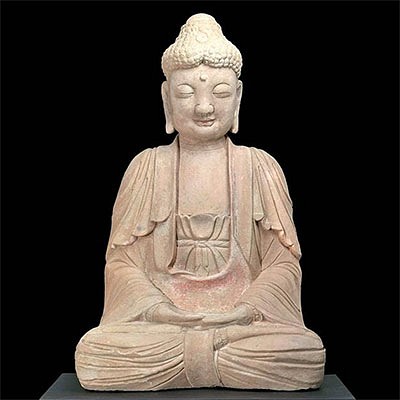Sican Lambayeque Copper Mask w/ Wings
Lot 108b
About Seller
Artemis Fine Arts
686 S Taylor Ave, Ste 106
Louisville, CO 80027
United States
Selling antiquities, ancient and ethnographic art online since 1993, Artemis Gallery specializes in Classical Antiquities (Egyptian, Greek, Roman, Near Eastern), Asian, Pre-Columbian, African / Tribal / Oceanographic art. Our extensive inventory includes pottery, stone, metal, wood, glass and textil...Read more
Estimate:
$18,000 - $25,000
Absentee vs Live bid
Two ways to bid:
- Leave a max absentee bid and the platform will bid on your behalf up to your maximum bid during the live auction.
- Bid live during the auction and your bids will be submitted real-time to the auctioneer.
Bid Increments
| Price | Bid Increment |
|---|---|
| $0 | $25 |
| $300 | $50 |
| $1,000 | $100 |
| $2,000 | $250 |
| $5,000 | $500 |
| $10,000 | $1,000 |
| $20,000 | $2,500 |
| $50,000 | $5,000 |
| $100,000 | $10,000 |
| $200,000 | $20,000 |
About Auction
By Artemis Fine Arts
Feb 18, 2021
Set Reminder
2021-02-18 10:00:00
2021-02-18 10:00:00
America/New_York
Bidsquare
Bidsquare : Exceptional Antiquities, Asian, Ethnographic
https://www.bidsquare.com/auctions/artemis-gallery/exceptional-antiquities-asian-ethnographic-6373
Museum-worthy examples of Egyptian, Greek, Roman, Etruscan, Near Eastern, Far East / Asian, Pre-Columbian, African / Tribal, Oceanic, Native American, Spanish Colonial, Russian, Fossils, Ancient Jewelry, Fine Art, so much more! Artemis Fine Arts info@artemisgallery.com
Museum-worthy examples of Egyptian, Greek, Roman, Etruscan, Near Eastern, Far East / Asian, Pre-Columbian, African / Tribal, Oceanic, Native American, Spanish Colonial, Russian, Fossils, Ancient Jewelry, Fine Art, so much more! Artemis Fine Arts info@artemisgallery.com
- Lot Description
Pre-Columbian, north coast of Peru, Sican / Lambayeque culture, ca. 10th to 11th century CE. A mask made of hammered copper, with two huge copper projections that rise, similar to horns but actually representing wings, from the top of the head. Fifteen trapezoidal copper sheet danglers hang from the "wings" and face. The eyes are bulbous, applied half-spheres, each with a wire with two discs spaced out along them projecting outward from the center of the eyes, a look that has been variously interpreted as tears or a magical/enhanced ability to see. The nose is large and three-dimensional, with two pointed, flat projections arising from underneath it, probably replicating nose ornaments. There is no mouth. Similar examples have cinnabar pigment applied to them, and this piece may once have had that too. White pigment covers much of the face, leaving the area around the eyes and below the nose a green copper patina color. Size: 25" W x 15.5" H (63.5 cm x 39.4 cm); 18.7" H (47.5 cm) on included custom stand.
The "wings" widen at their terminals into openwork depictions of a lord with a curved headdress and either multiple arms or wings of his own. This is Naymlap, the traditional founder of the Lambayeque dynasty, who came from the south by sea and colonized the region before, it was said, sprouting wings and flying off into the sunset in a dramatic display of his magical powers. He seems to have been worshipped by his descendants, and silver and gold vessels, weapons, and jewelry are all adorned with his likeness.
This mask was made to adorn the body of a deceased elite member of the Sican society - gold and silver were reserved for royalty, and copper for the nobility. Sican elites were patrons of workshops that made fine metal objects like this one, and they took their wealth with them when they died. Buried in mounds, they would be entombed in high style. It is difficult to imagine just how much wealth each individual was buried with - for example, one of the few controlled excavations of a high status Sican tomb, archaeologists found 1.2 tons of grave goods inside of a 3 meter square shaft tomb that also contained a man, aged 40 to 50 alongside four sacrificial victims, two women and two children. This included vast quantities of gold, silver, and copper artifacts.
Provenance: private Hawaii, USA collection; ex Eugene Lions collection, Geneva, Switzerland, collected 1960 to 2000
All items legal to buy/sell under U.S. Statute covering cultural patrimony Code 2600, CHAPTER 14, and are guaranteed to be as described or your money back.
A Certificate of Authenticity will accompany all winning bids.
We ship worldwide and handle all shipping in-house for your convenience.
#132549The copper surface was originally painted and later on covered in textiles to preserve it, with the remains of both pigment and adhesive visible in some areas. Small areas of corrosion, but overall in excellent condition, with a pretty, pale turquoise, mottled patina. "Wings" are not attached to the mask but appear to be contemporary to it.Condition
- Shipping Info
-
All shipping is handled in-house for your convenience. Your invoice from Artemis Gallery will include shipping calculation instructions. If in doubt, please inquire BEFORE bidding for estimated shipping costs for individual items.
-
- Buyer's Premium



 EUR
EUR CAD
CAD AUD
AUD GBP
GBP MXN
MXN HKD
HKD CNY
CNY MYR
MYR SEK
SEK SGD
SGD CHF
CHF THB
THB















